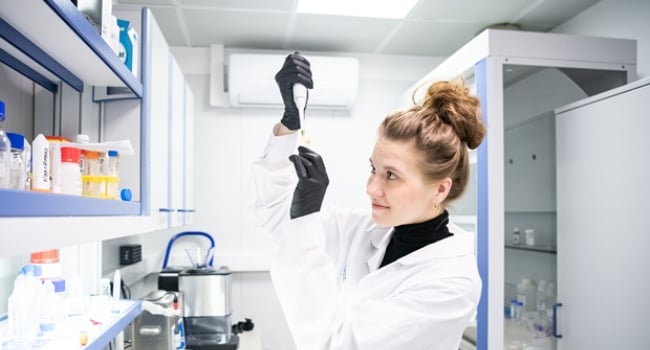- Latest news▼
-
15:32, April 26 ESCMID: New method of purifying the air with ultraviolet light could protect world from new pandemic

-
08:43, April 26 Enzymes that convert different blood groups into first group are discovered

-
19:41, April 25 Children’s Hospital Los Angeles and International Center of Professional Development Allergy/Immunology Conference

-
17:31, April 25 JAMA: patient grew long, curly eyelashes because of chemotherapy

-
11:08, April 25 Mpox epidemic declared in Republic of the Congo

-
08:31, April 25 OU: quitting smoking 4 times more likely to cure laryngeal cancer

-
01:20, April 25 Paralyzed man in China writes hieroglyphs using neural implants placed in his brain

-
15:11, April 24 Zombie deer disease possibly linked to hunters’ deaths

-
12:27, April 23 Appetite: Scientists found out the secret to the appeal of large portions of fast food

-
10:33, April 23 Scientists test new approach to fighting viruses

-
08:38, April 23 Ketamine may help with postpartum depression

-
22:12, April 22 Unhealthy amount of sugar found in baby food products of a well-known brand

-
19:41, April 22 Air pollution puts health of more than 1.6 billion workers globally at risk

-
17:25, April 22 Scientists found baked goods and lack of sleep to be more dangerous than alcohol

-
16:02, April 22 342 cases of measles recorded in Armenia so far in 2024

All materials
Scientists discover mechanism that could improve platinum-based cancer therapies

Scientists have identified a protein that, when exposed to it, allows cisplatin-resistant cancer cells to become sensitive to treatment. Cisplatin and other similar platinum drugs are incredibly effective at killing fast-growing cancer cells, which is why they have been used in cancer treatment for over 45 years. However, these drugs are not targeted and can cause debilitating toxic side effects leading to reduced lifestyle, and for patients in poor health, they are considered unsuitable for use.
In a study published in Cancer Research, researchers say they found that the protein puromycin-sensitive aminopeptidase (NPEPPS) plays a role in regulating the response to platinum-based chemotherapy in patients with bladder cancer.
"We found that this protein is the driving force behind resistance to platinum-based therapies. If we remove it experimentally or pharmacologically, we can re-sensitise cancer cells to their pre-drug-resistant level of response," said study co-author Dr James Costello.
Costello and his team sought to understand why most bladder cancer patients respond poorly to platinum-based drug regimens. By identifying the role that NPEPPS plays, the researchers were then able to genetically disrupt NPEPPS function, ultimately making cancer cells more sensitive to platinum drugs.
"Our comprehensive evaluation involving the use of tiny organoids derived from patients' bladder cancer samples yielded results that could make this effective treatment available to many more patients," the scientists said.
According to the scientists, this new therapeutic approach could allow lower doses of platinum-based drugs to be administered, potentially reducing debilitating side effects and making platinum-based therapies more effective.
"A high percentage of all cancer patients will receive platinum-based drugs in their treatment. Our work opens the door to extending these results to other cancers. Our goal is to help platinum-based drugs be more effective in many clinical settings," the study said.
Follow NEWS.am Medicine on Facebook and Twitter
- Video
- Event calendar
- Children’s Hospital Los Angeles and International Center of Professional Development Allergy/Immunology Conference
- First Armenian-German Conference entitled “Heart Failure Spring School”
- Allogeneic bone marrow transplant in case of hematological malignancy performed in Armenia for first time
All materials
- Archive
- Most read
month
week
day
- Scientists found baked goods and lack of sleep to be more dangerous than alcohol 1048
- Next pandemic likely to be triggered by flu - scientists 1029
- 342 cases of measles recorded in Armenia so far in 2024 970
- Unhealthy amount of sugar found in baby food products of a well-known brand 877
- Air pollution puts health of more than 1.6 billion workers globally at risk 872
- Ketamine may help with postpartum depression 865
- Appetite: Scientists found out the secret to the appeal of large portions of fast food 859
- Scientists test new approach to fighting viruses 840
- Scientists develop new method to safely stimulate immune cells to fight cancer 832
- Cognitively stimulating jobs in midlife could lower dementia risk in old age, study finds 828
- Blood test can determine who is at risk of developing multiple sclerosis - scientists 826
- Zombie deer disease possibly linked to hunters’ deaths 790
- BrainStimulation: electrical brain stimulation alleviates anxiety and depression in the elderly 759
- Mpox epidemic declared in Republic of the Congo 597
- Paralyzed man in China writes hieroglyphs using neural implants placed in his brain 569
- Find us on Facebook
- Poll





